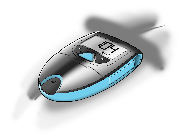 A blood glucose monitor concept for diabetics that’s simpler to use, less cumbersome to carry and has a third of the environmental impact of traditional devices has been developed by Cambridge Consultants as a result of ‘Ecovation’ – an approach developed by the company to integrate environmental considerations into its radical concept generation process.
A blood glucose monitor concept for diabetics that’s simpler to use, less cumbersome to carry and has a third of the environmental impact of traditional devices has been developed by Cambridge Consultants as a result of ‘Ecovation’ – an approach developed by the company to integrate environmental considerations into its radical concept generation process.
Many existing blood glucose monitors require separate lancets, test strips, storage tubs for carrying these items, and sharps bins for disposal. Applying the Ecovation process, Cambridge Consultants conducted a ‘life cycle assessment’ on a popular blood glucose monitor to identify which elements had the highest environmental impact and so should be the focus for innovation. It was identified that less than 5% of the environmental impact could be attributed to the monitor itself – with more than 70% due to the high number of single-use disposables that are consumed over the lifetime of the device.
Ideas generated to reduce the environmental impact ranged from efficient packing of unused and used components, to safe reuse of ‘single-use’ lancets and test strips. The winning concept achieved a 65% reduction in environmental impact by integrating the functionality of three previously discrete consumables and getting the device to do the handling – not the user. The final challenge was then to create a single consumable cartridge, which was both reliable and suitable for manufacturing.
The resulting integrated monitor design is easier to carry around, with fewer consumables requiring separate storage and transport. The cartridge design means the user only has to worry about loading the device once every 28 tests – and, by combining the lancets and test strips in the monitor itself, the glucose test is far easier to administer and more discreet for the user.
“What makes this concept so exciting is that, while it provides a sustainable alternative to the status quo, it also offers distinct usability advantages,” said Andy Pidgeon, of the Medical Technology division at Cambridge Consultants.
According to the company, the approach employed in Ecovation can be applied to any type of product to reduce its overall environmental impact.


